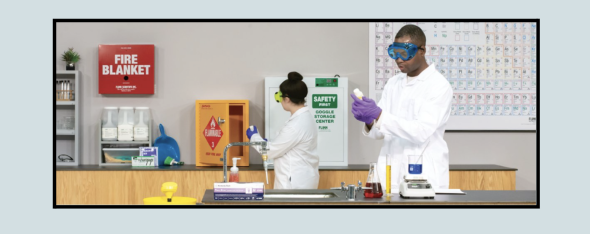2024- 2025 Safety Training Information
Link to this section

High School Science Safety Training
Please join us on Wednesday, August 14, 2024, for our Annual Safety Training at Lincoln High School. If you weren't added to the calendar invite, contact Priscilla Perez at perezp2@sfusd.edu for an invitation.

Middle School Science Safety Training
Please look for an email from your Science Teacher Leader on Wednesday, August 14, 2024, regarding our Annual Safety Training, which will be conducted asynchronously this year. If you didn't receive an email, see the flyer below for more information. If you have any questions, contact Priscilla Perez at perezp2@sfusd.edu.
Annual Safety Training Link to this section
All secondary science teachers had the annual safety training on Wednesday, August 14, 2024. We hope it was beneficial for all those that attended.
- Middle School was Asynchronous. See the flyer for the link.
- High School met in person at Lincoln High School in the morning. Agenda Link (includes links to resources). Slide deck (note slide deck was for Chem/Dept Chair session)
Did you miss the safety training on 8/14? The HS Safety Training Flyer or MS Safety Training Flyer has a link to the asynchronous training.
We ask that all science teachers complete a laboratory equipment survey to document the status of their classrooms.
- For MS teachers: http://tinyurl.com/sf-ms-equip
- For HS teachers: http://tinyurl.com/sf-hs-equip
Teacher Safety Documents for Students and Families Link to this section
Chemical Inventory and Waste Disposal
Link to this section
Chemical Inventory and Storage (Due Annually by May 15th)

We are required by the state (OSHA and DPH) to report site-specific chemical inventory annually. Please follow the Instructions to complete site inventory by May 15th.
Chemical Storage: Chemicals need to be stored in such a way that like substances are stored together and those that could potentially interact with each other are kept separately. Some chemicals need to be stored in flammables or corrosives cabinets. See this more detailed guidance for chemical storage.
Chemical Sweeps: The inventory update provides a great opportunity for school sites to turn unwanted items into waste. See the instructions for the form you need to fill out with your request for a waste pickup.
Hazardous Waste Pickups

High School Department Chairs and Middle School Teacher Leaders have been notified of our upcoming waste pickups.
- Waste pickups will happen during Fall Break 2024; please sign off by November 13th, 2024 that your request is ready for pickup.
- Any site not picked up during that window will be picked up during Winter Break 2024, with a deadline of December 13th, 2024.
- Once you gather new waste, check out how to submit a hazardous waste pick-up form. To request labels and/or containers for waste, please fill out this request form.
General Guidance:
- Length and quantities: According to CalOSHA and DPH, school sites must not accumulate waste for more than 6 months. Please make sure to submit pickups each time you are asked. Avoid waiting if you have waste. Total quantities should not exceed 55 gallons.
- Labeling: For waste generated during labs, use a white label and make sure to include a generation date and any hazards.
- Chemical Sweeps: If you are using the "dot system," you will be able to look at your shelves and easily see which chemicals are no longer being used. In addition, any lab waste created during the year will also need to be added to the pickup request. Please label, set-aside, and submit the form for any known and unknown chemicals that are surplus, unused, or expired. Make sure that when chemicals are set aside as waste that they continue to be kept by compatibility.
- Avoid unknowns: The best way to avoid generating unknown waste is to label your containers when the lab waste is created. Include the date, reactants, and product on the label. A pink chemical waste sticker also goes on the container. If you need these labels, check with your department chair or please fill out this request form.
- Storage: Make sure waste is stored according to compatibility, just like your ongoing inventory.
If you have unknown waste, follow the above procedure with as much information as you can.
Disposing of biological waste
- Microbial specimens in petri dishes need to be sterilized using an autoclave or bleach. They are then disposed of in the regular trash. You will follow the hazardous waste procedures above for disposal of the bleach.
- When you receive a shipment of specimens, be sure to look at the SDS so you know what was used to preserve the specimens. If it includes formalin, you will follow the hazardous waste procedures above for disposal.
- For larger specimens and other waste from dissection labs see these instructions for how to bag and dispose of bio waste. If you need bags, please fill out this request form.
- If you have old biological specimens that may have been preserved in formaldehyde, use the instructions for how to inventory biological specimens. It is not recommended that you continue to keep specimens preserved in formaldehyde. These specimens need to be included in the chemical waste pick-up request. Leave them in the containers and list on the waste removal form.
Return to Employee Pages Link to this section
This page was last updated on October 30, 2024



